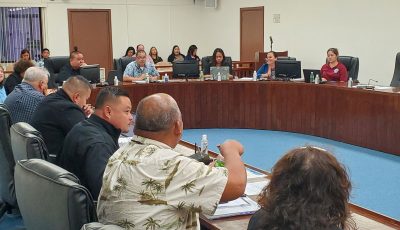PSS, BOE in a financial pickle
A financial dilemma looms over the Public School System and the Board of Education as another round of financial austerity measures take effect.
The BOE was informed yesterday by key members of the PSS leadership—finance director Chris Ching and acting Education commissioner Lynette Villagomez—that a second round of austerity measures would cost PSS an estimated $7.1 million.
The austerity measures are being attributed to the lingering impact of Super Typhoon Yutu.
Villagomez explained that, of the $42 million appropriated to PSS for fiscal year 2019, a total of $15.6 million has already been transferred as of April 26, 2019, leaving the central government owing only $26.1 million. Minus the estimated $7.1 million in austerity measures, PSS would be left with only $19.3 million.
For the remainder of fiscal year 2019, PSS expenses includes $17.5 million for payroll, $2.2 million for Group Health and Life Insurance, and $750,000 for Commonwealth Utilities Corp. bills—a total of $22.45 million.
If PSS continues to function without any cost-cutting regulations, they would be operating at a deficit of over $3 million.
Proposed cuts
Villagomez presented the BOE with two possible cost-cutting routes.
One, to consolidate schools in order to cut down on utilities and employee costs while maintaining the class hours per day and preventing the discontinuation of education.
Two, reducing the work hours of non-certified employees by 10 percent, or eight hours, per paycheck. This means that year-round employees, including PSS management, janitors, maintenance, bus drivers, and more would be the most affected. Villagomez did note that certified employees, including teachers, counselors, and the like would also be affected in the future.
BOE member and Saipan representative Marylou Ada opposed the first option, noting that consolidating schools would only mean more responsibilities and troubles.
BOE Rota representative Herman M. Atalig agreed, noting that a consolidated school on Rota did little to save on expenses.
Both options come with the recommendation to start the school year 2019-2020 in September 2019.
BOE split on work hour reductions
Heated talks on the 10-percent work-hour reduction followed.
Atalig said that he was not informed beforehand of the cuts—as he usually prefers—noting that he is aware of the austerity measures implemented government-wide.
BOE Saipan representative Andrew Orsini opposed cutting down work hours for non-exempt personnel.
He told Saipan Tribune that it was “very unfair” and voted against the measure with Atalig.
Both BOE chair Janice Tenorio and Ada voted for the measure. Ada made the motion to approve the proposal while Tenorio seconded her motion.
Tenorio noted that, once the measure is approved by the BOE, there would be a 30-day grace period before the measure is implemented. If the BOE decided to table discussions until the next board meeting in June 2019, it would put off the implementation of cost-cutting measures to July 2019.
According to Ching, if the BOE does not approve the cost-cutting measure as soon as possible, there would be less money left in the PSS pot to cover upcoming expenses, translating to possibly a more severe cost-cutting measure in the future.
Ada’s concern is for schools to not shut down and for education to continue uninterrupted.
BOE Tinian representative Philip Mendiola-Long was absent.
With the vote at 2-2, it was essentially defeated. However, after a second executive session, the BOE agreed to go into recess to discuss further how the cost-cutting measures would be implemented to garner approval.
Villagomez was given until today to submit a new cost-cutting proposal, and the BOE members have until this Thursday, 1pm at the BOE building on Capital Hill to vote on the measure.
“Opening schools in September would save more on utilities… That would leave us with another month of savings,” said Ada in an interview. “We need all of the savings we can get from here on until the end of fiscal year [2019],” she said.



























